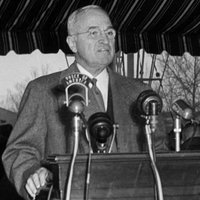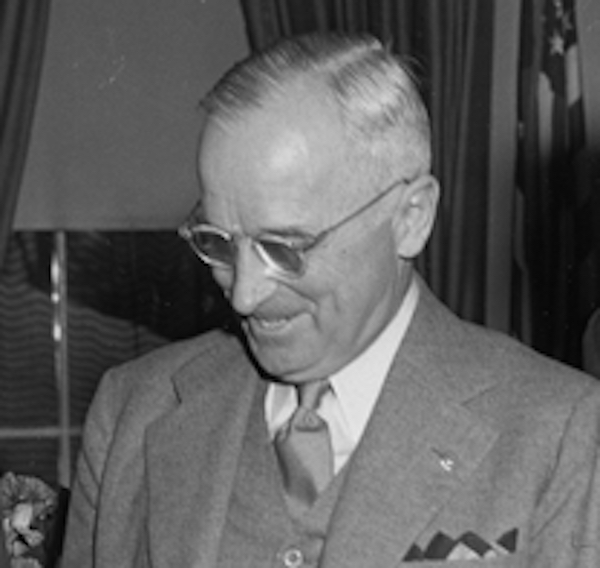
President Harry Truman unveiled the “Campaign of Truth”– a multi-faceted U.S. government’s international information policy – in a foreign policy speech on April, 20, 1950 to members of the American Society of Newspaper Editors as the answer to harsh Soviet propaganda attacks on the United States and its allies. He was also responding to domestic criticism that his administration was not doing enough to counter disinformation from the Soviet Union and other communist regimes.[ref]Harry S. Truman, “Address on Foreign Policy at a Luncheon of the American Society of Newspaper Editors,” April 20, 1950. National Archives, Harry S. Truman Library and Museum. https://www.trumanlibrary.gov/library/public-papers/92/address-foreign-policy-luncheon-american-society-newspaper-editors.[/ref]
Truman’s “Campaign of Truth” address was designed to inspire journalists, including Voice of America’s federal employees of the Department of State broadcasting at the time to the world in multiple languages from VOA studios in New York, to offer stronger and more effective resistance to Soviet propaganda and to communist influence. “Everywhere that the propaganda of the Communist totalitarianism is spread, we must meet it and overcome it with honest information about freedom and democracy,” Truman said. He also alluded to the media’s criticism of his foreign policy and indirectly to criticism of the Voice of America. “Foreign policy is not a matter for partisan presentation,” Truman said as he outlined his administration’s plan to resist communism and its propaganda with the “Campaign of Truth.”
President Truman’s ‘Campaign of Truth’ Address, April 20, 1950

In a democracy, foreign policy is based on the decisions of the people.
One vital function of a free press is to present the facts on which the citizens of a democracy can base their decisions. You are a link between the American people and world affairs. If you inform the people well and completely, their decisions will be good. If you misinform them, their decisions will be bad; our country will suffer and the world will suffer.
You cannot make up people’s minds for them. What you can do is to give them the facts they need to make up their own minds. Now that is a tremendous responsibility.
Most of you are meeting that responsibility well–but I am sorry to say a few are meeting it very badly. Foreign policy is not a matter for partisan presentation. The facts about Europe or Asia should not be twisted to conform to one side or the other of a political dispute. Twisting the facts might change the course of an election here at home, but it would certainly damage our country’s program abroad.[ref]Harry S. Truman, “Address on Foreign Policy at a Luncheon of the American Society of Newspaper Editors,” April 20, 1950. National Archives, Harry S. Truman Library and Museum. https://www.trumanlibrary.gov/library/public-papers/92/address-foreign-policy-luncheon-american-society-newspaper-editors.[/ref]


